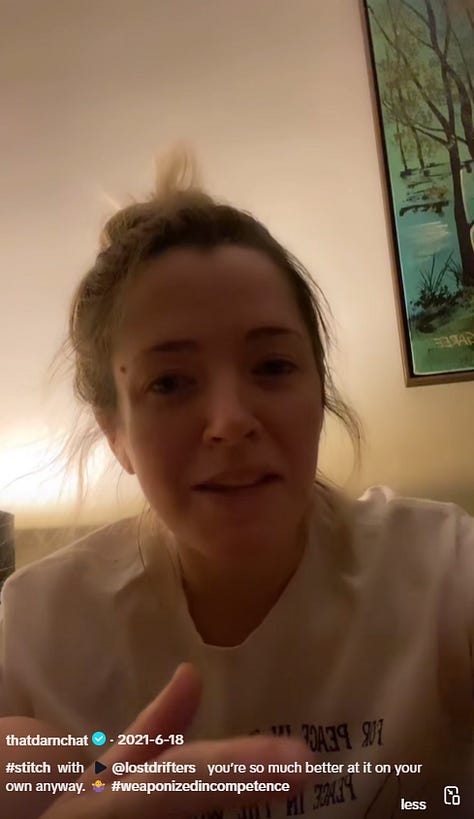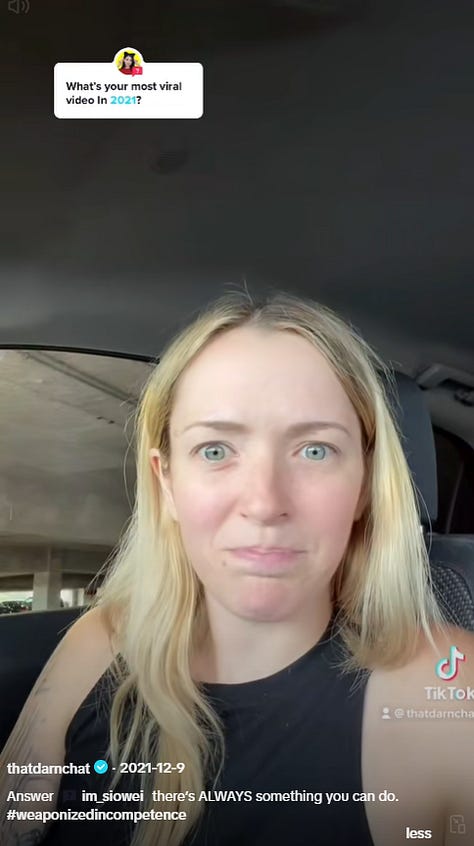If you know me from Instagram, TikTok, or Time to Lean, you’ve probably seen me talk (or yell) about domestic labor, the mental load, weaponized incompetence, and the quiet dynamics that can make home feel like a pressure cooker.
But I think it’s time for a little backstory.
I’ve been online for a long time. Friendster, LiveJournal, DeviantArt, MySpace, Tumblr, Facebook, Instagram—and then in 2020, I ended up on TikTok. At the time, I was a full-time educator. When schools moved to virtual learning in March of 2020, I had a 9-month-old, a 3-year-old, and a full-time job. My husband and I were both still employed, which was a privilege—but it came with its own challenges. Two kids at home (one who couldn’t yet walk), no childcare, and no playdates meant we were constantly tag-teaming parenting and work.
Like so many, I started spending more and more time socializing through my phone. After bedtime, my husband would often work late, and I’d scroll—through dance trends, funny animals, social commentary, and a sea of videos from mothers trying not to lose their shit.
There was so much to be angry about. And I was especially furious watching the desperate conditions caregivers were navigating get turned into “relatable” content—framed as funny, cute, or quirky.
So I started poking fun back at the “satire.”
I threatened to flip a table if I saw one more video of a woman celebrating her husband for holding the baby while she took an uninterrupted shower. I got loud about the harm of asking men to be “better helpers” when they were doing a shitty job on purpose. I initially called that behavior “weaponizing competency,” and it struck a chord.
I noticed a pattern that kept showing up in sitcoms, memes, comment sections, viral videos, and real-life conversations. It was a repeated, often gendered dynamic where someone avoided responsibility by doing a task poorly—or not at all. People laughed it off or minimized it, and the go-to advice was always the same: teach men to be better helpers.
That’s when I refined the term to “weaponized incompetence” and launched the hashtag #weaponizedincompetence to call out those deeply normalized behaviors. The concept wasn’t new. It’s been around for ages— in homes, workplaces, between housemates— but pointing out how it’s been normalized, identifying it in trending videos, refusing to laugh at it, and drawing attention to its impact brought it to light in a new way.
My early TikToks—like this one, this one, and this one—quickly went viral. And right around that same time, people started searching.









I kept going—calling out the “funny” videos, naming the harm, and leaning all the way into the accusation that I was humorless for not laughing. Was I a miserable shrew—or righteously enraged?
Google searches for "weaponized incompetence" spiked right as the conversation took off online
You can literally see the shift in interest as more people started looking for the language to describe what they were experiencing. The phrase started showing up everywhere—in comment sections, conversations, and mainstream media, including InStyle, Wondermind, Upworthy, Scary Mommy, and The Everymom.
You can see how the conversation has evolved in this playlist, where I continue to unpack the behavior, challenge the narratives that excuse it, and explore what’s actually needed to create equity at home.
Since then, my work has grown far beyond that original term. I’ve collaborated with Fair Play to create curriculum for young people on the mental load. I’ve hosted a retreat and countless workshops, developed tools and resources, and partnered with brilliant, cross-disciplinary thinkers to make care work visible, valuable, and shared. I’ve coached people through changing long-standing patterns in their homes and their relationships. And I’ve kept coming back to this central truth:
Care is culture-shifting.
It’s essential. It’s not extra.
It’s the backbone of every home, workplace, system, and community—and we’ve been taught to devalue it for far too long.
I built my platform on connecting the dots between care work in our homes and the way it’s treated in culture— especially in popular media. Over the years, I’ve explored domestic equity in partnerships and across culture, media, and history. I talk about equity. Burnout. Emotional labor. Unpaid work. Why asking for help shouldn’t feel like a full-time job. How we show up for each other—and why, and how so often, it feels like the world is resting on the shoulders of the domestic and care workers. Because it is.
Now, I’ve written a book. It’s called No More Mediocre, and it’s coming out in just a few months(preorder here and get an exclusive resource!). It’s about breaking free from the nag paradox, calling out weaponized incompetence, and building relationships and homes rooted in equity, clarity, and real connection.
This Substack is where I’ll share more about what went into the book, what didn’t make it in, and what I’m still learning and unlearning every day.
I don’t have a posting schedule. I’m not trying to build a content machine here. I’m just looking for a space to write more freely—to share older videos with added commentary, new essays, stories, reflections, and the bigger-picture ideas behind the work I do.
If you’re tired of doing everything—and being expected to do it quietly—you’re not alone. I’m glad you’re here.
More soon,
Laura






I didn’t know you crystallized #weaponizedincompetence! Well! You should know that your work has become part of the social fabric of my friends and family. We have become each other champions when it comes to evolving invisible care work to an obvious, talked-about and valued contribution to the world. My partner has evolved so much and so have I.
*I* value my contribution of the last 15 years so much more in fact that I am taking myself on a four month trip to celebrate that I am ‘retired’ from the intense work of caring for little humans. Actually - today is the anniversary of becoming a mom.
HELL YES DUDE 👏🏻 👏🏻 👏🏻 Loved this trip down memory lane 🫶🏼